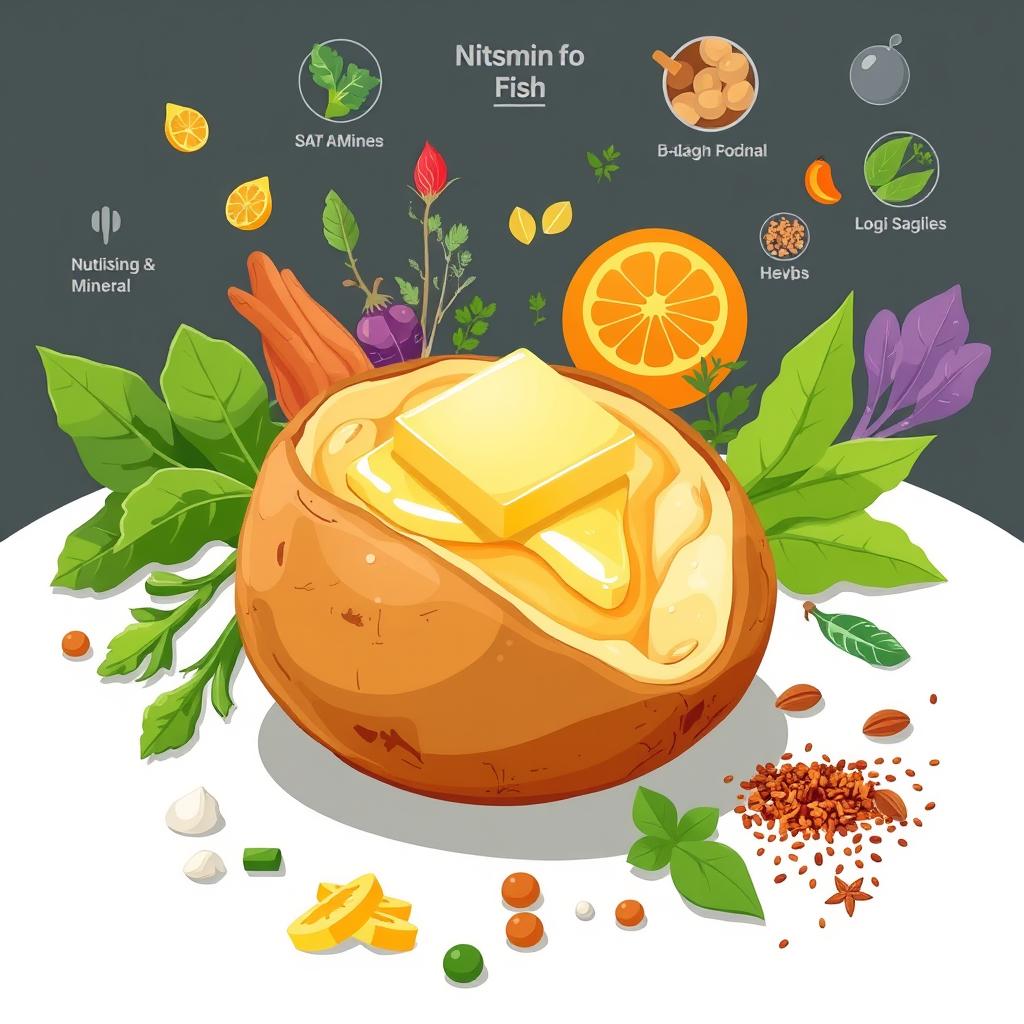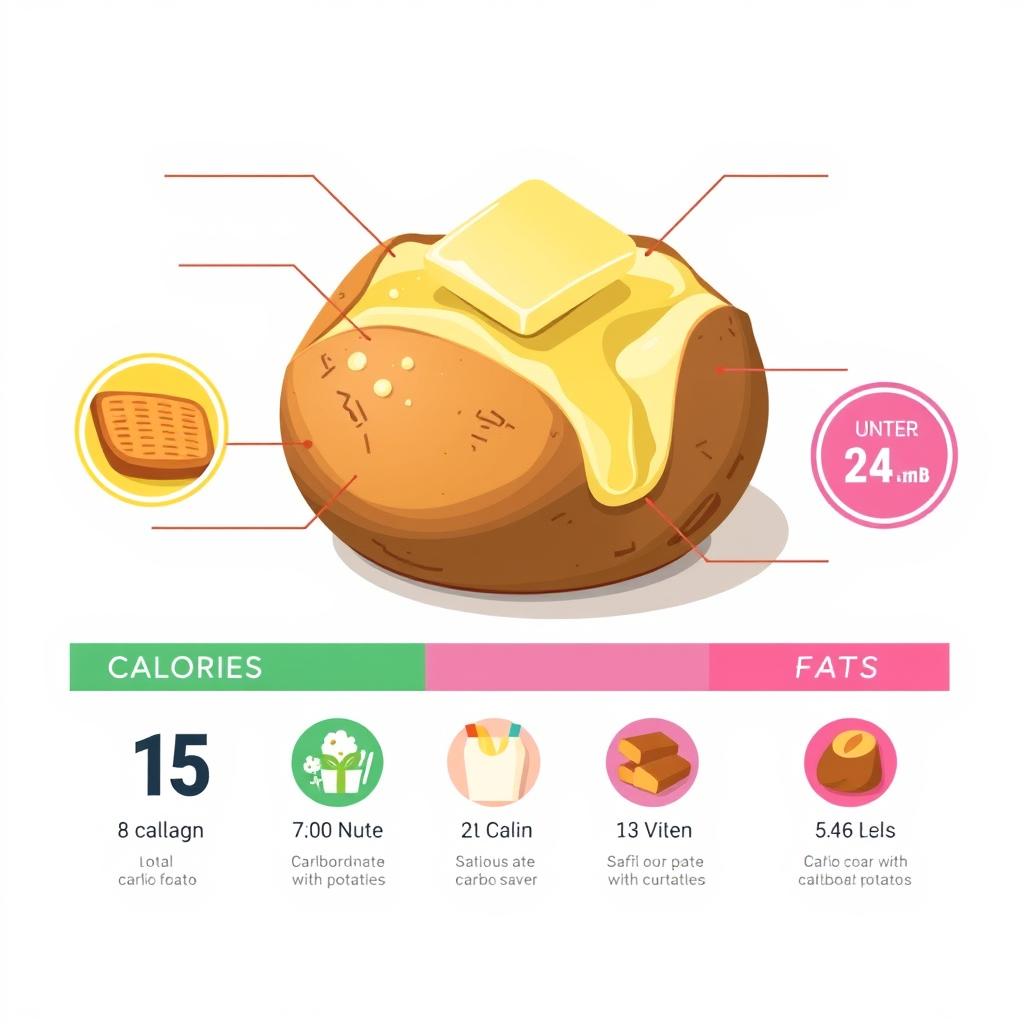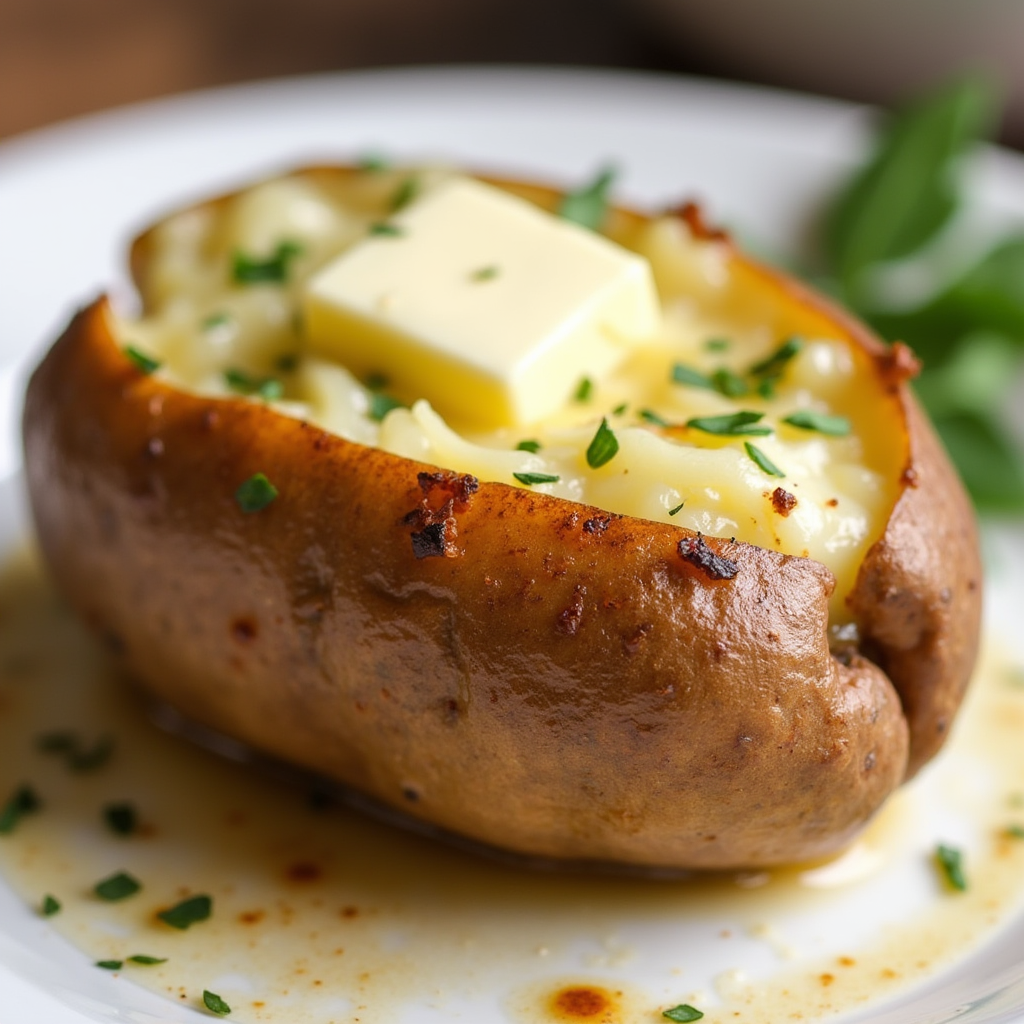Exploring the nutrition facts for baked potatoes with butter shows they’re more than just a side dish. They’re packed with nutrients that boost your health when eaten right.
Potatoes are full of benefits that might surprise you. Adding a bit of butter makes this comfort food a good choice for a balanced diet. Knowing the nutritional facts helps you pick better meals and get the most health benefits from this favorite food.
If you’re into wellness, managing your weight, or just love tasty food, baked potatoes are a great pick. They’re full of nutrients and can fit into many diets. Learning about their nutritional content lets you enjoy them without worry.
Key Takeaways
- Baked potatoes offer substantial nutritional value
- Butter adds flavor and some additional nutrients
- Portion control is essential for balanced eating
- Potatoes provide complex carbohydrates and fiber
- Cooking method impacts overall nutritional profile
Understanding Baked Potato Nutrition Basics
Baked potatoes are more than a tasty side dish. They’re full of nutrients that boost your health. Exploring baked potato nutrition data shows why they’re great for your diet.

Essential Nutrients in Potatoes
So, what makes a baked potato healthy? Let’s look at its nutritional benefits:
- Rich in vitamin C, supporting immune function
- Provides potassium for heart and muscle health
- Contains vitamin B6 for metabolism support
- Offers essential minerals like magnesium and phosphorus
Role of Potatoes in a Balanced Diet
Potatoes are a great source of complex carbs for lasting energy. They’re naturally fat-free and can be part of a nutritious meal plan. The trick is in how you prepare them and how much you eat.
| Nutrient | Amount per Medium Potato | % Daily Value |
|---|---|---|
| Calories | 160 | 8% |
| Protein | 4g | 8% |
| Dietary Fiber | 4g | 16% |
| Vitamin C | 28mg | 30% |
Serving Size Recommendations
For the best nutrition, eat one medium-sized baked potato per serving. This keeps calorie intake in check while giving you key nutrients. Add lean proteins and veggies for a well-rounded meal.
“A baked potato can be a nutritious foundation for a healthy diet when prepared mindfully.” – Nutrition Experts
Caloric Content of a Buttery Baked Potato

Knowing the calories in a baked potato is key for those watching their diet. A medium-sized potato has about 160-180 calories before adding butter. Adding a pat of butter increases the calories by around 100, making it 260-280 calories total.
“Not all calories are created equal, especially when it comes to nutrient-dense foods like potatoes.” – Nutrition Expert
The buttery baked potato is more than just calories. It’s packed with vitamins and minerals, making it a fulfilling meal. Tracking baked potato calories helps you make better food choices.
- Medium potato: 160-180 calories
- Butter (1 tbsp): ~100 calories
- Total buttery baked potato: 260-280 calories
Controlling portion size is important for calorie management. Using smaller potatoes or less butter can help keep calorie intake in check. This way, you can still enjoy a tasty and healthy meal.
Pro tip: Try using lighter butter alternatives or measuring your butter to better control your baked potato calories.
Complete Nutrition Facts for Baked Potato with Butter
Potatoes are packed with health benefits. Knowing their nutritional profile helps you make better food choices. They are truly valuable for your diet.
Macronutrient Breakdown
A medium baked potato has a good mix of nutrients. Carbs are the main energy source. Protein helps with muscle health.
- Carbohydrates: Approximately 37 grams per medium potato
- Protein: Around 4 grams per serving
- Fat: Varies based on butter quantity
Vitamin and Mineral Content
Baked potatoes are full of vitamins and minerals. Potassium is great for your heart and muscles. Vitamin C and B vitamins boost your immune system and metabolism.
| Nutrient | Amount per Medium Potato |
|---|---|
| Potassium | 926 mg |
| Vitamin C | 28 mg |
| Vitamin B6 | 0.5 mg |
Dietary Fiber Analysis
Yes, baked potatoes are high in fiber! A medium one has about 4 grams. Exploring potato varieties can increase your fiber intake.
Potatoes are not just empty calories – they’re nutrient-dense foods that can be part of a balanced diet.
Health Benefits of Baked Potatoes
Are baked potatoes with butter good for you? Knowing what makes a baked potato healthy changes how we see this veggie. Baked potatoes are full of nutrients that help us stay healthy.
Potatoes are loaded with important nutrients. They’re good for us when we cook them right. Let’s look at the main benefits:
- Rich in vitamin C for immune system support
- Contains potassium for heart health
- Provides complex carbohydrates for sustained energy
- Delivers antioxidants that combat cellular damage
“Baked potatoes can be a nutritious part of a balanced diet when consumed mindfully.” – Nutrition Experts
Thinking about what makes a baked potato healthy? Look at its nutrients. Potatoes have amazing health perks:
| Health Benefit | Nutritional Impact |
|---|---|
| Blood Pressure Regulation | High potassium content helps manage cardiovascular health |
| Digestive Support | Dietary fiber promotes gut health and smooth digestion |
| Weight Management | Low-calorie, nutrient-dense food supporting metabolic function |
Adding a bit of butter can make the potato even better. Choose good butter and eat it in small amounts. This way, you get to enjoy a tasty meal while staying healthy.
Butter’s Nutritional Impact on Your Baked Potato
Choosing the right butter can change how healthy your baked potato is. Knowing about butter nutrition helps you pick better options. This way, you can enjoy your favorite comfort food without feeling guilty.
There are many butter types, each with its own nutritional benefits. This can turn your baked potato into a more exciting dish.
Exploring Butter Varieties
- Salted butter: Contains 100 calories per tablespoon
- Unsalted butter: Provides more control over sodium intake
- Grass-fed butter: Higher in omega-3 fatty acids
- Clarified butter: Lower lactose content
Fat Content Considerations
The nutrition of your baked potato toppings changes with the butter you pick. Grass-fed butter, for example, has more nutritional benefits than regular butter.
| Butter Type | Calories | Total Fat | Saturated Fat |
|---|---|---|---|
| Regular Butter | 102 | 11.5g | 7.2g |
| Grass-Fed Butter | 100 | 11g | 7g |
| Clarified Butter | 112 | 12.7g | 8g |
“Choose wisely – your butter can make or break the nutritional value of your baked potato.” – Nutrition Experts
Learning about butter nutrition lets you make better choices for your baked potato. You can balance taste with health, making your meal both delicious and nutritious.
Sodium Content and Heart Health Implications
Knowing how much sodium is in a baked potato with butter is key for heart health. A plain baked potato has about 10-15 mg of sodium. Adding butter, especially salted kinds, can raise sodium to 100 mg or more per serving.
Sodium is important for our bodies, but too much is harmful. The American Heart Association says adults should eat less than 2,300 mg of sodium daily.
“Moderation is key when enjoying baked potatoes with butter”
- Plain baked potato sodium: 10-15 mg
- Salted butter addition: Up to 90 mg per tablespoon
- Potential sodium increase: 100-105 mg per serving
Are baked potatoes with butter good for you? It depends on your diet. To keep sodium levels down, try these tips:
- Use unsalted butter
- Limit butter quantity
- Choose low-sodium seasonings
- Balance your daily sodium consumption
People with heart issues or high blood pressure need to watch their sodium. Talking to a doctor can help you eat baked potatoes safely.
Healthier Alternatives to Traditional Butter Toppings
Looking for healthier baked potato toppings doesn’t mean you have to give up flavor. You can make your favorite side dish better with creative, nutritious options. These choices boost both taste and health benefits.
Switching from traditional butter to new, nutrient-rich options can greatly improve potato side dish nutrition.
Low-Fat Options
Here are some tasty low-fat alternatives for your baked potato:
- Greek yogurt with fresh herbs
- Salsa for a zesty kick
- Cottage cheese with chives
- Hummus for creamy texture
Plant-Based Alternatives
Plant-based toppings can make your potato side dish nutrition better while adding amazing flavor.
| Topping | Calories | Nutrition Benefit |
|---|---|---|
| Avocado | 80 | Healthy fats, fiber |
| Olive Oil | 40 | Heart-healthy monounsaturated fats |
| Nutritional Yeast | 20 | B-vitamins, protein |
“Transforming your baked potato doesn’t require compromising on taste or nutrition.”
Try these alternatives to find new, exciting ways to enjoy your potato. This way, you can keep your diet balanced.
Preparation Methods for Maximum Nutrition
Getting the most out of a potato starts with how you prepare it. The healthiness of a baked potato depends on your cooking and serving methods. The way you cook it can greatly affect its nutritional value.
Here are a few key steps to boost potato nutrition:
- Keep the skin on during cooking to retain essential nutrients
- Choose low-temperature oven baking for better nutrient preservation
- Avoid overcooking to maintain vitamin and mineral content
Cooking temperature is key to potato health benefits. Lower temperatures help keep vitamins and minerals intact. Baking at about 425°F is ideal for a crispy outside and a nutritious inside.
“The way you prepare your potato can be just as important as the potato itself” – Nutrition Experts
For the best potato nutrition, follow these tips:
- Wash potatoes thoroughly before cooking
- Pierce the skin to allow steam to escape
- Use minimal added fats during preparation
- Consider serving with nutrient-rich toppings like Greek yogurt or herbs
Microwave cooking is quick but might slightly lower nutritional content compared to oven baking. Still, it’s a good option if you’re short on time.
Incorporating Baked Potatoes into a Weight Management Plan
Managing your weight doesn’t mean giving up on tasty foods like baked potatoes. Knowing the calories in baked potatoes and making smart choices can help. This way, you can enjoy this nutritious food while keeping your diet healthy.
Baked potatoes can be a smart choice for weight management if you eat them wisely. It’s all about knowing the right portion sizes and keeping a balance of nutrients.
Portion Control Guidelines
It’s important to control how much baked potato you eat to manage your weight. Here are some helpful tips:
- Aim for a medium-sized potato (about 5-6 ounces)
- Limit butter to 1 teaspoon to keep calories in check
- Choose baked potatoes with skin for maximum fiber
Meal Planning Strategies
Are baked potatoes with butter good for you? Yes, they can be when used right. Here are some meal planning tips:
- Pair with lean protein for balanced nutrition
- Use herbs instead of excessive butter
- Include vegetable toppings for added nutrients
| Potato Size | Calories | Recommended Frequency |
|---|---|---|
| Small (3 oz) | 130 | 2-3 times per week |
| Medium (5 oz) | 220 | 1-2 times per week |
| Large (8 oz) | 350 | Occasionally |
By knowing the calories in baked potatoes and making smart choices, you can enjoy this versatile food. It supports your weight management goals.
“Moderation and mindful eating are the keys to enjoying nutritious foods like baked potatoes.” – Nutrition Expert
Comparing Baked Potatoes to Other Side Dishes
When looking at potato side dish nutrition, it’s good to know how baked potatoes stack up against other sides. Each dish has its own nutritional perks, and baked potatoes are quite impressive.
| Side Dish | Calories | Protein (g) | Fiber (g) | Potassium (mg) |
|---|---|---|---|---|
| Baked Potato (medium) | 160 | 4.3 | 3.8 | 940 |
| White Rice (1/2 cup) | 103 | 2.1 | 0.3 | 55 |
| Pasta (1/2 cup) | 110 | 4.0 | 1.0 | 30 |
Baked potatoes have some big nutritional wins:
- They’re packed with potassium for heart health
- They have more fiber for better digestion
- They’re full of vitamins like C and B6
A medium baked potato gives you about 30% of your daily vitamin C.
Your side dish choice can really affect your nutrition. Rice and pasta give you calories, but baked potatoes offer more nutrients. They help meet your body’s needs.
Remember, how you prepare and top your potato matters for its nutrition. Choose low-fat toppings or healthier options to keep your potato’s nutritional value high.
Conclusion
Looking into the nutrition facts for baked potatoes with butter shows us a new side of this classic dish. Baked potatoes can be both tasty and healthy if we make them right. It’s all about eating them in balance and using smart cooking methods.
So, are baked potatoes with butter good for you? It really depends on how much you eat and what else you’re having. Potatoes are full of good stuff like potassium and vitamin C. But, the butter adds extra calories and fat. Try using avocado spread instead for a healthier, tasty option.
Enjoying baked potatoes should be about balance and trying new things. Try different ways of cooking them and add different toppings. This way, you can enjoy a baked potato while also taking care of your health.
Remember, it’s all about the big picture with food. See baked potatoes as part of a wide range of healthy foods. This way, they can help you stay healthy and happy.
FAQ
How many calories are in a typical baked potato with butter?
A medium-sized baked potato has about 160 calories. Adding a tablespoon of butter adds around 100 calories. So, a buttered baked potato usually has 260-300 calories, depending on size and butter amount.
Are baked potatoes with butter a healthy side dish?
Baked potatoes with butter can be healthy if eaten in moderation. Potatoes are full of vitamin C, potassium, and fiber. Butter adds fat-soluble vitamins. Just be careful with portion sizes and choose quality butter.
What are the primary nutrients in a baked potato with butter?
A baked potato with butter has carbs, protein, and fat. It’s rich in potassium, vitamin C, and vitamin B6. It also has fiber, calcium, and iron. The butter adds vitamins A, D, and E, and saturated fats.
How much fiber is in a baked potato?
A medium-sized baked potato with skin has 3-4 grams of fiber. That’s about 10-15% of your daily fiber needs. Most of the fiber is in the skin, so eat the potato with skin on.
Is the sodium content high in a baked potato with butter?
The sodium content varies with butter type. A plain potato has 10-15 mg of sodium. A tablespoon of salted butter adds 90-100 mg. For low sodium, use unsalted butter or herbs.
Can baked potatoes help with weight management?
Baked potatoes can aid in weight management if eaten wisely. They’re low in calories, high in fiber, and filling. Just control portion sizes and watch toppings like butter. Pairing with lean proteins and veggies makes for a balanced meal.
What are some healthier alternatives to butter on a baked potato?
Try olive oil, Greek yogurt, mashed avocado, salsa, herbs, or low-fat sour cream. These options add flavor and nutrients without the saturated fat and calories of butter.

